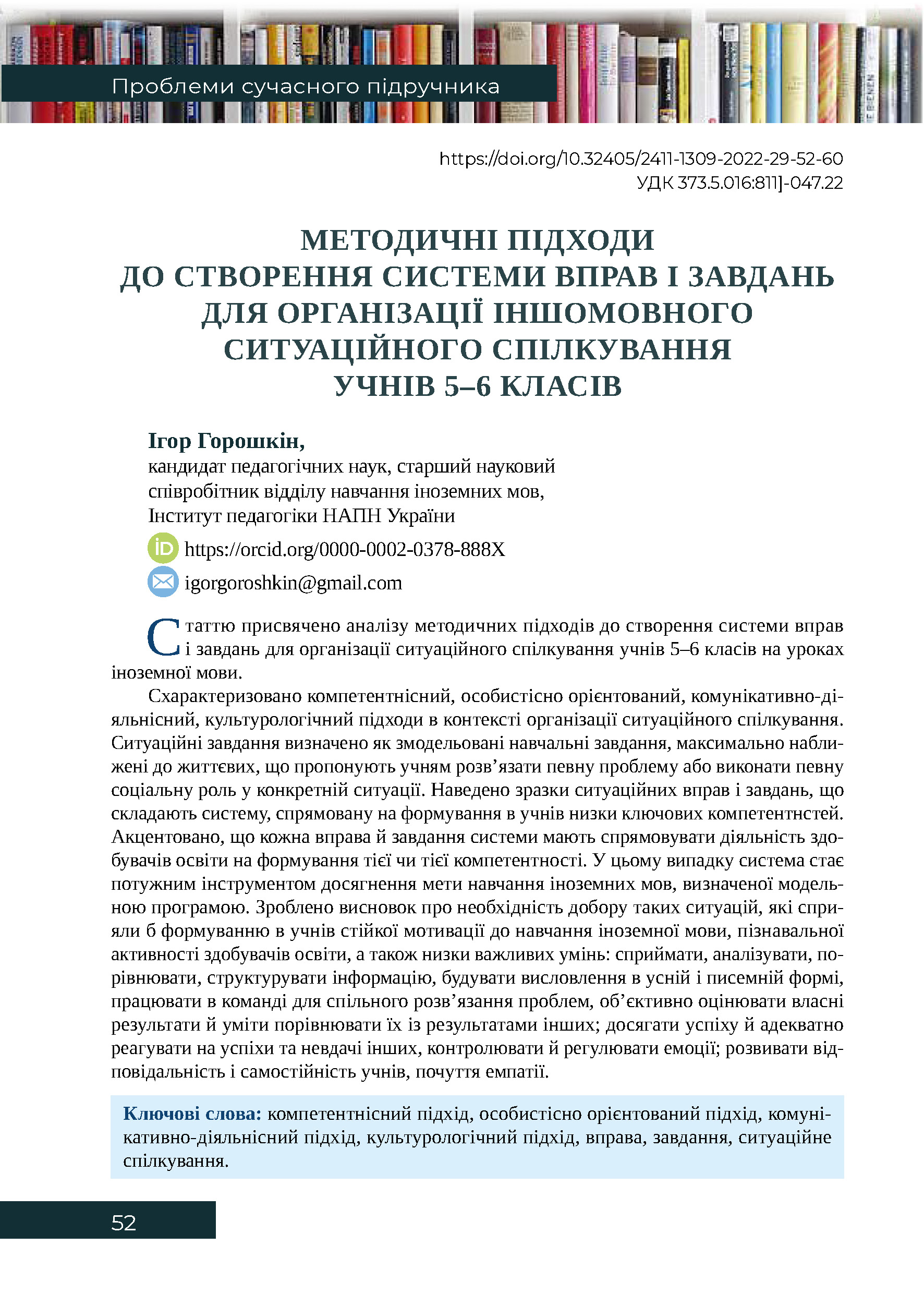Methodological Approaches to the Creation of an Exercise and Task System for Organization of Foreign Language Situational Communication for Students of Grades 5–6

Published 2023-02-06
Keywords
- competency-based approach,
- personality-oriented approach,
- communicative and activity approach,
- cultural approach,
- situational task
How to Cite

This work is licensed under a Creative Commons Attribution-NonCommercial-ShareAlike 4.0 International License.
Abstract
The article is devoted to the analysis of methodological approaches to the creation of a system of exercises and tasks for the organization of situational communication of 5th‑6th grade= students in foreign language lessons. The article characterizes the results of an online survey conducted to determine the attitude of fifth-grade students to learning a foreign language in general and performing situational tasks in particular.
Competency-based, personality-oriented, communicative-active, cultural approaches in the context of situational communication organization are characterized. Situational tasks are defined as simulated educational tasks as close as possible to life ones that offer students to solve a certain problem or fulfill a certain social role in a specific situation, they significantly contribute to the transition of students from activities in an educational situation to activities in a life situation that meets the requirements of competency-based training. It is emphasized that each exercise and task of the system should direct the activity of education seekers to the formation of a specific competency. In this case the system becomes a powerful tool for achieving the goal of learning foreign languages defined by the model program. Samples of situational exercises and tasks that make up a system aimed at forming a number of key competencies in students are given. It was concluded that it is necessary to select such situations that would contribute to the formation of students’ sustainable motivation to learn a foreign language, the cognitive activity of education seekers, as well as a number of important skills: to perceive, analyze, compare, structure information, build expressions in oral and written form, work in a team for joint problem solving, to objectively evaluate one’s own results and be able to compare them with the results of others; achieve success and adequately respond to the successes and failures of others, control and regulate emotions; to develop students’ responsibility and independence, a sense of empathy.
Downloads
References
- Державний стандарт базової середньої освіти. (2020). Постанова Кабінету Міністрів України від 30 вересня 2020 р. № 898. https://zakon.rada.gov.ua/laws/show/898-2020-%D0%BF#n16.
- Ніколаєва, С.Ю. (ред.). (2013). Методика навчання іноземних мов і культур: теорія і практика: підручник для студентів класичних, педагогічних і лінгвістичних університетів Київ: Ленвіт.
- Омельчук, С. (2013). Підхід до навчання» як базова категорія сучасної лінгводидактичної науки. Українська мова і література в школі, 2, 2–7.
- Редько, В. Г., Шаленко, О. П., Сотникова, С. І., Коваленко, О. Я., Коропецька, І. Б., Якоб, О. М., Самойлюкевич, І. В., Добра, О. М., Кіор, Т. М. (2022). Модельна навчальна програма «Іноземна мова. 5–9 класи» для закладів загальної середньої освіти. https://imzo.gov.ua/model-ni-navchal-ni-prohramy/movno-literaturna-osvitnia-haluz/inozemna-mova/
- Редько, В.Г. (2017) Конструювання змісту шкільних підручників з іноземних мов: теорія і практика. Київ: Педагогічна думка.
- Сікорський, П.(2021) Освітні педагогічні підходи та їх вплив на формування навчальних технологій. Освітні обрії, 1 (52), 96‒100.
- Ушакова, І.М. (2016) Вікова психологія: курс лекцій. Харків, НУЦЗУ.
